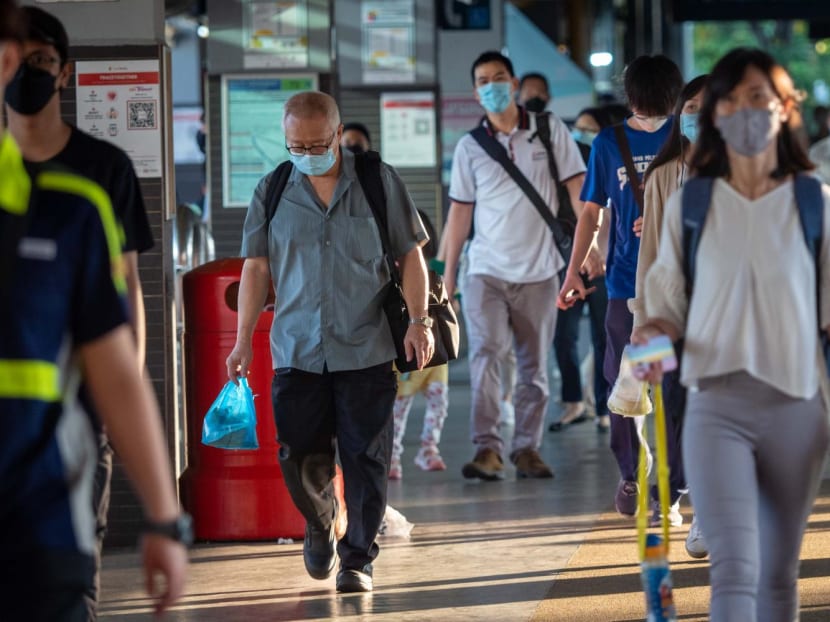XBB wave waning, but be prepared for reintroduction of Covid-19 rules when serious infection waves hit: Ong Ye Kung
SINGAPORE — While plans to reintroduce the mask-wearing rule have been stood down after the Covid-19 XBB wave subsided "much earlier than expected", Health Minister Ong Ye Kung said on Monday (Oct 31) that the public must expect some infection controls and regulations to be reinstated should a new and more severe infection wave hit.

- Health Minister Ong Ye Kung said that some infection controls and regulations may be reinstated should a severe Covid-19 infection wave hit
- He added that the Government was on the verge of making people wear masks again due to the recent rise in Covid-19 cases
- However, with an earlier-than-expected peak in infection numbers, such a move was not needed
- Mr Ong encouraged older individuals to keep up-to-date with their vaccinations, adding that 53,000 people have taken the latest bivalent vaccine
SINGAPORE — While plans to reintroduce the mask-wearing rule have been stood down after the Covid-19 XBB wave subsided "much earlier than expected", Health Minister Ong Ye Kung said on Monday (Oct 31) that the public must expect some infection controls and regulations to be reinstated should a new and more severe infection wave hit.
Speaking at the HMI Institute’s 20th anniversary and graduation ceremony, Mr Ong revealed that the Government was on the verge of making people wear masks again due to the rising cases caused by the coronavirus strain XBB recently.
“For the XBB wave, the multi-ministry task force was very ready to reimpose indoor masking and, perhaps, targeted vaccination-differentiated safe management measures should the situation worsen," he said.
"Fortunately, the infection numbers peaked and declined much earlier than we expected, and we can stand down the contingency plans, at least for now."
However, he warned that Singaporeans must be ready to deal with some infection controls being back in place should new strains of the Sars-CoV-2 coronavirus surface, which may be “recombinants of existing subvariants”.
One cannot expect every new virus variant to have the same characteristics such as spreading more easily but causing less severe symptoms.
“It is a random process of nature, and a new recombinant variant could always take on characteristics of a parent (virus) that lead to more severe illnesses,” Mr Ong said.
He added that the country’s recovery and standing as an international hub and open economy “makes us vulnerable as we could be one of the first cities in the world to experience a new and dangerous variant”.
“We therefore cannot afford to be complacent. We need to be prepared for a nasty infection wave, and make the necessary contingency plans.”
Mr Ong encouraged older individuals to keep up-to-date with their vaccinations because it is more likely that they may develop severe illnesses when infected with Covid-19.
He added that in the last month, two out of 100 infected persons aged 70 or above who were not fully vaccinated either died or ended up under intensive care in hospitals.
So far, about 53,000 individuals have taken the latest bivalent vaccine, Mr Ong said.
The Ministry of Health will roll out the bivalent vaccines to the younger age groups in a few weeks.
Providing an update on patients who have been seeking medical treatments for non-Covid-related conditions, Mr Ong said that they have increased in numbers.
This could be because the pandemic has disrupted their care for their non-Covid-19 medical problems or chronic ailments, they have stopped taking their medications, or being infected by Covid-19 has triggered a deterioration of their chronic illnesses several weeks later.
Mr Ong said that hospitals here have put in place measures such as encouraging non-emergency cases to visit general practitioner clinics or urgent care centres instead of the emergency departments in hospitals, as well as providing more care to patients who remain in the emergency departments for four hours or more.
“We can all do our part to help out our healthcare workers, by (going to) emergency departments only during emergencies and taking our Covid-19 vaccines, which will significantly reduce the probability of us falling severely ill if infected,” Mr Ong said.








